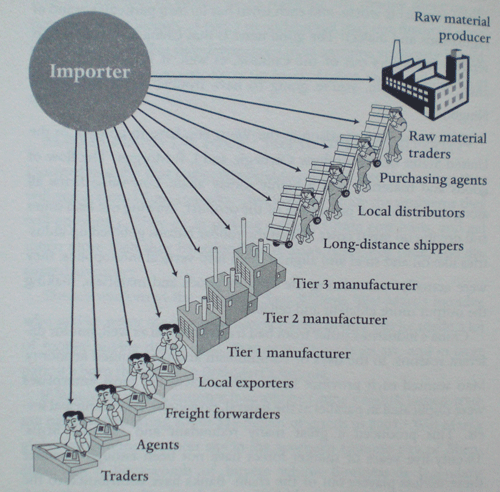 Traceability is like genealogy, but for production. It allows you to know the origins of each batch of finished products.
Traceability is like genealogy, but for production. It allows you to know the origins of each batch of finished products.
It is very useful when a few products are found to have serious problems:
- You can investigate, try to find the root cause, and (hopefully) fix the problem at the level of the faulty process.
- In case you need to recall products that are already on the market, a good traceability system allows you to reduce the number of products to recall.
Challenges in China
If traceability is important for you and if you purchase in China, you will be faced with two challenges.
First, the number of players that are part of the supply chain. Here is the way it is illustrated in All The Tea In China:

Can you keep track of the whole supply chain? It won’t be easy.
Second, most Chinese factories do not keep records of this type of information.
What type of information can you keep track of?
I would suggest three main categories:
- Where did the raw materials and components come from? What is the manufacturer’s lot number?
- What process did they go through? When? What machines (with what setup) and what operators were involved in each process?
- When, how, and by whom was it inspected? With what tools? When and how were these tools calibrated?
But does it make sense to keep all these records? Not necessarily. It depends on your objective.
If you just source finished products and you don’t want to help your suppliers improve their processes, you need to focus on reducing your exposure to product recalls.
Reducing your exposure to a recall
Remember, if you import something into your country and you sell it, you are considered as liable as if you were manufacturing it yourself.
In the event of a major safety problem, you might have to recall some products. If possible, you will only recall the products impacted by the same problem… But how will you know this, without some form of traceability?
To simplify, let’s distinguish three cases:
1. There is no traceability at all
You will probably have to recall all the similar products you have ever sold on your market. That’s the worst case.
2. There is traceability about the main component’s batch
For example, you purchase tablet PCs, and the retailer tells you the adaptor explodes after several days of use.
Let’s say your Chinese manufacturer has kept track of the lot number from the adaptor’s supplier. And let’s assume that your supplier follows a first in, first out logic for its inventory of components.
The good news is, you can probably convince the retailer to recall only the tablet PCs that came with the adaptors from the suspicious batch. Of course you will try to make sure other batches were safe, too…
3. There is also traceability at the process level
Let’s say there was a power shortage during the oven process of a brake pad. The treatment could not be performed the right way. But the products are sold anyway, and they break too easily. They happen to cause a recall.
What you will need to know is this: what pieces were placed in the oven in the same batch as the faulty products? Chances are, only this batch should be recalled.
What do you think?
